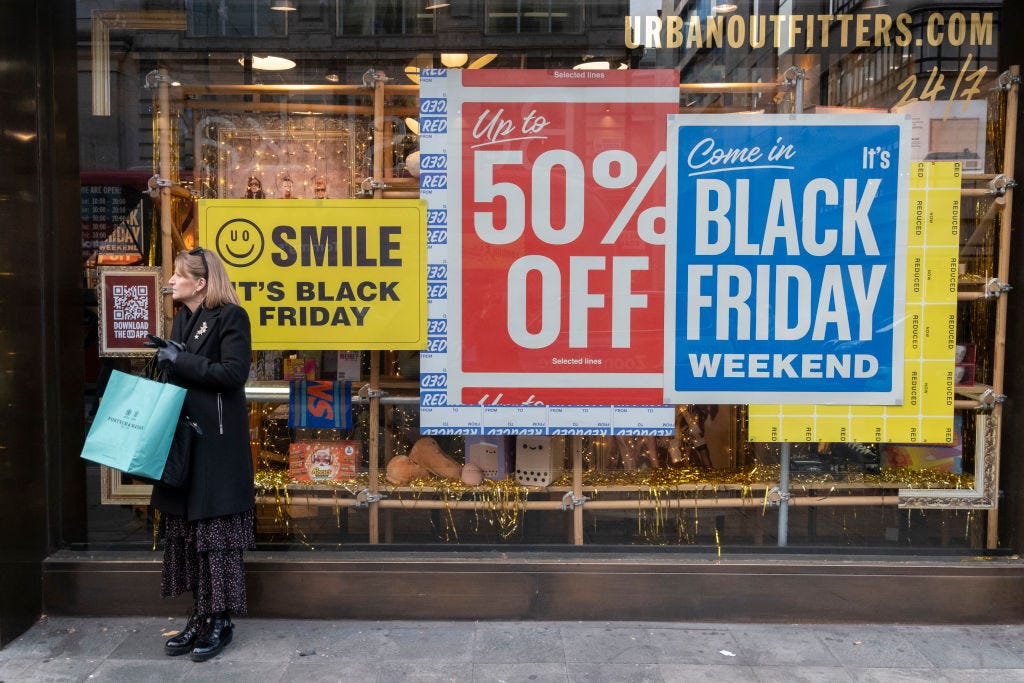What to make of Black Friday...
Retail and Christmas + Podcast bonus content + Ed Smith book recommendations
Hello and welcome to the latest edition of Off to Lunch. In today’s edition we look at Black Friday as well as our new podcast episode with Tom Hayes and some book recommendations from Ed Smith…
This weekend is the biggest online shopping weekend of the year - running from Black Friday to Cyber Monday. It is a vital period for struggling retailers desperately hoping for a cash boost after loading up on stock. Spending patterns over the next few weeks will be used to judge the mood of consumers. For what it’s worth, I think that savings built-up during lockdown and a determination to enjoy the festive period post-Covid will mean that spending is better than expected…
Black Friday is a relatively new phenomenon in the UK. In fact, I was retail correspondent at The Daily Telegraph when it first arrived in shops in 2013, leading to chaotic scenes as customers rushed to grab televisions, tablets and smartphones. Check out this story from 2013 where I refer to Asda running “US-style Black Friday discount” for the first time. It was Asda, then owned by US retail giant Walmart, and Amazon who brought Black Friday across the Atlantic from the United States to the United Kingdom. By 2014 I was writing big preview pieces about Black Friday and it was clear from the big audience these articles generated - and the number of Google searches for discounts - that interest in this shopping event was huge. I saw that first-hand with early-morning trips to report from Asda and Tesco supermarkets, where there were huge queues outside and a mad rush for bargains inside…
In the US, Black Friday serves a purpose - it marks the start of the Christmas shopping season and gets consumers spending again after the indulgences of Thanksgiving. In the UK it has always been little more than a marketing stunt. Indeed, it quickly became clear that it might be more trouble than it was worth. The Black Friday rush caused websites to crash and complaints from police about being called to trouble at shops. Also, rather than encouraging extra spending from consumers, it brought forward spending that would have been made anyway, leading to worrying lulls in sales for retailers in early December. This is why Black Friday promotions have been toned down by retailers in the UK since those early days and why the promotions are spread out over more than one day. This year, Royal Mail strikes and supply chain disruption are added reasons to do that…
Having said that, Black Friday marks the start of a vital period for retailers. Barclaycard is among the organisations tracking spending…
A word of warning on judging the success (or not) of Black Friday. Retail sales figures - whether industry-wide or company-specific - only tell part of the story. The old saying in retail is that “turnover is vanity, profit is sanity”. With inflation running at more than 10 per cent - and spending likely to be distorted by the World Cup and Covid restrictions this time last year - that is true more than ever.
When looking at like-for-like sales for retailers you must ask all sorts of questions. This measure of performance is not standardised and retailers are largely free to interpret it how they wish when publishing their numbers. Questions to ask include: how are online sales measured compared to shop sales? Are sales on gift vouchers included? How are returns taken into account? How are shops that have been extended or moved measured? Does this cover exactly the same period as last year or are there slight differences? What were volumes like, ie the number of products sold rather than their total value?
It is not until retailers publish their full financial results, long after their post-Christmas trading update, that you can accurately judge their performance and compare the profit margins they made. For instance, a retailer may boast of a rise in sales in the run-up to Christmas when they publish a trading update in January. But when they publish their annual results in April it may become clear that this only occurred because they dramatically cut their prices in order to shift unsold stock, meaning their profits actually fell. You may also see writedowns on the value of unsold stock that was left, demonstrating that the Christmas period was not as good for the retailer as they expected...
Anyway, for those shopping online or in-store today, best of luck…
Podcast bonus content…
The latest episode of our Business Studies podcast went live on Tuesday. It’s an interview with Tom Hayes, the trader who was sentenced to 14 years in prison in 2015 for rigging Libor. Hayes was released last year and is trying to have his conviction quashed by the Criminal Cases Review Commission. Hayes’s story is extraordinary. The 40-minute episode covers how he got into trading, the early years of his career, the explosion of the Libor-rigging scandal, the court case, life in prison and the battle to clear his name.
You can listen to the episode here on Substack, here on Apple and here on Spotify
Hayes was reflective, thoughtful and open during the interview, including when responding to difficult questions and recalling painful memories about what prison was like.







